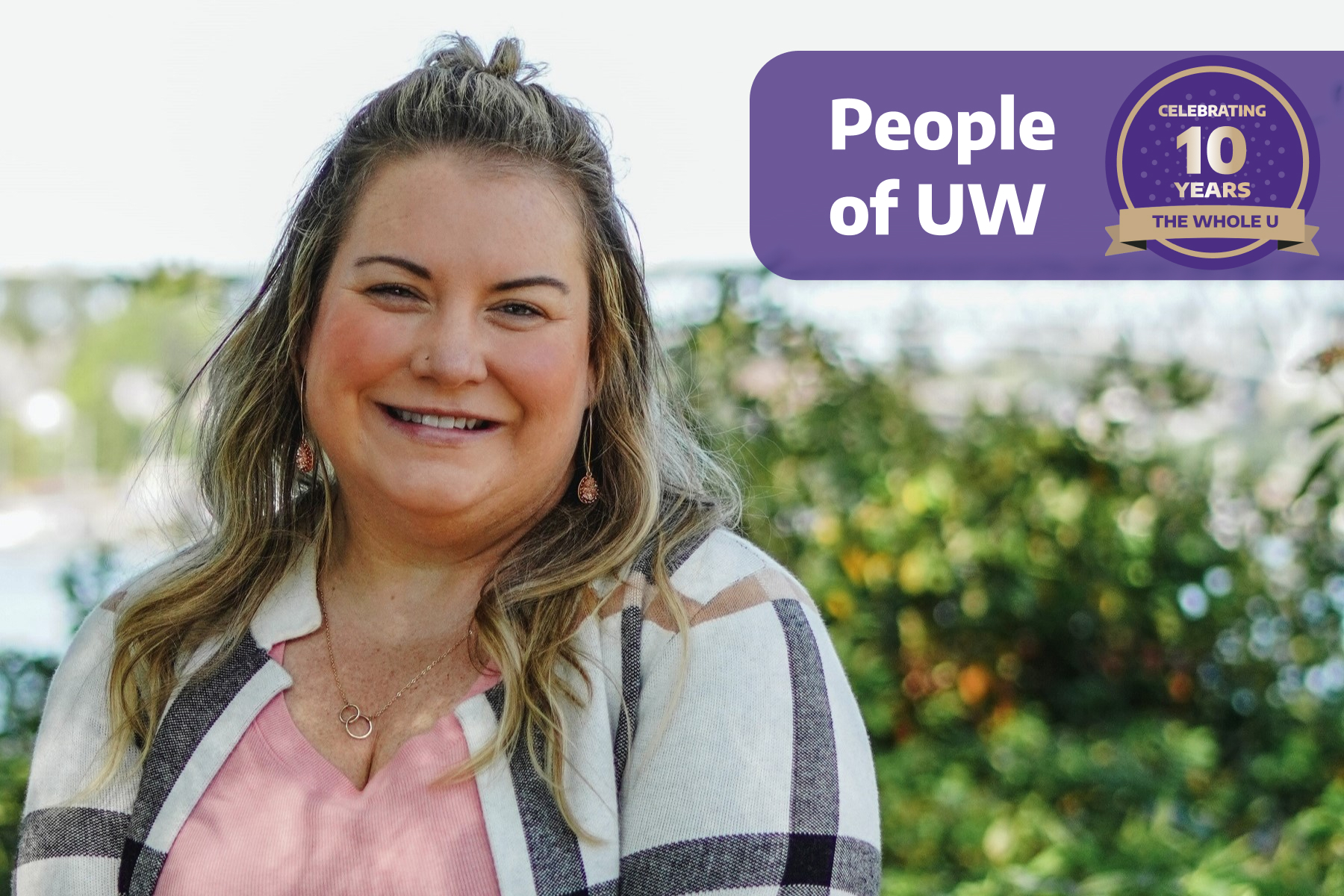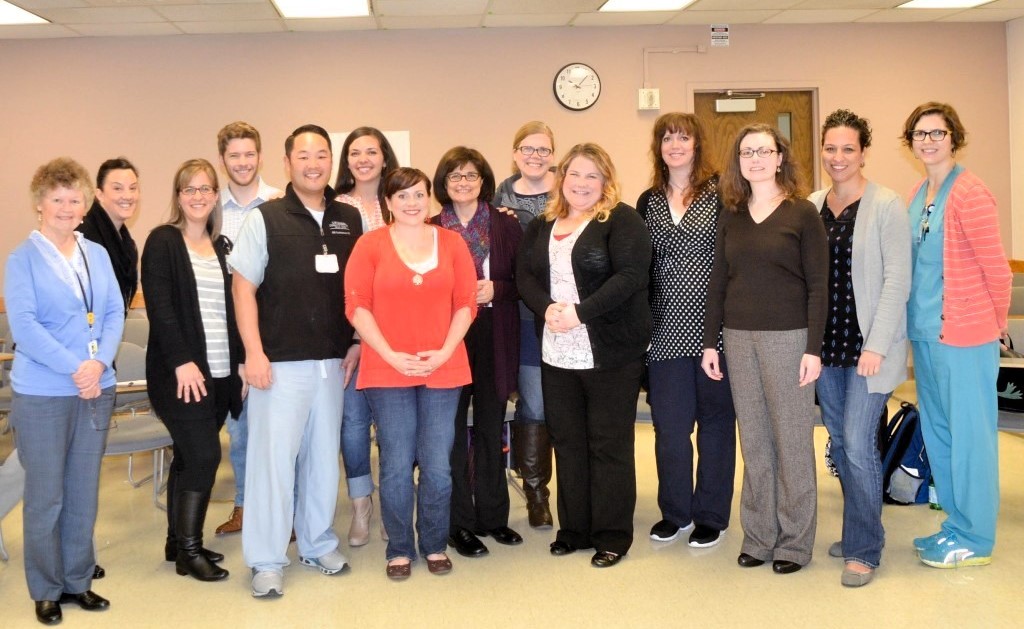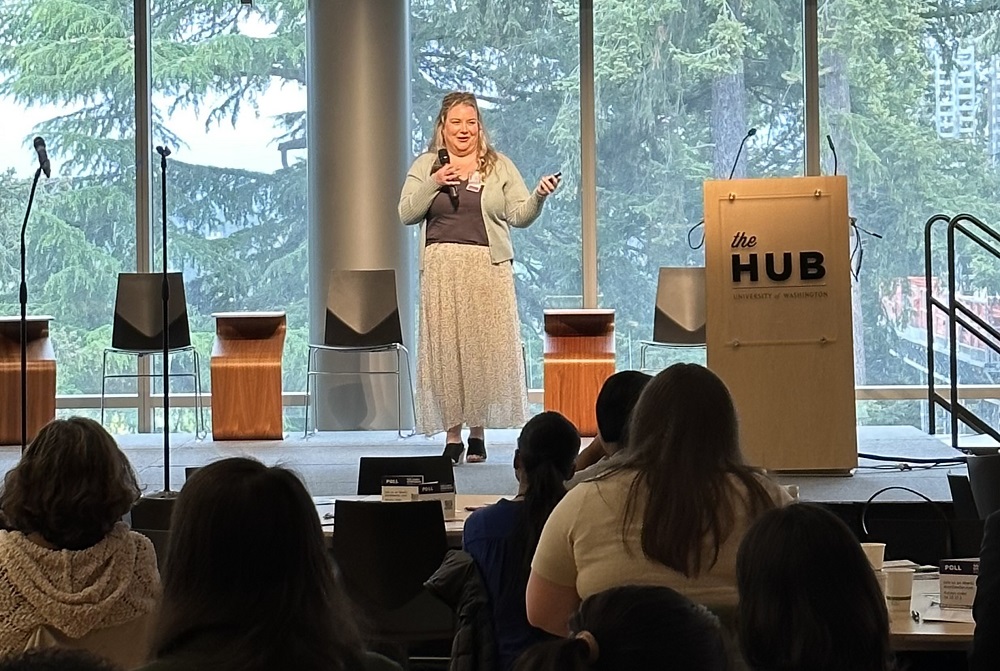
Marie Cockerham cares for the caregivers of UW Medical Center
Marie Cockerham felt ready for a new challenge. She had worked nearly two decades as a clinical nurse and, increasingly, a nurse educator when she took on a staff support position at UW Medical Center that was created to address the pervasive emotional stress and strain borne by healthcare providers.
In this new role, Cockerham would lead operations and logistics for the launch of a new peer support program serving the UW Medicine system before settling in as site coordinator for UW Medical Center’s campuses and clinics.
The UW Medicine Peer to Peer Program launched on January 13, 2020. A week later, the system’s Northwest Hospital received its first case of a mysterious new virus called COVID-19.
Everything changed in an instant. As the grim realities of a prolonged pandemic began to set in, Cockerham received word that she had been unceremoniously appointed to an elevated role as the system’s mental health supervisor within the UWMC emergency response command center.
“I thought, okay, cool,” she recalls, with a nervous laugh. “I have no idea what that means.”
And then she got to work.
Following her curiosity
Cockerham has never shied away from the new and unfamiliar. She was raised in a practical family in Montana and Western Washington. But her boundless curiosity led her on an admittedly meandering academic path across community colleges, UW and WSU. She studied communications at first, then social work, then education.
In all this, she noticed a recurring theme: helping people, in one way or another.
Marrying together her defining forces of care and curiosity led Cockerham to discover nursing at Washington State.
Her first clinical rotation was her first time inside a hospital since her own birth. “I’d never even had a broken bone, nothing,” she says. “So, I had no idea. And I didn’t really know what a nurse did.”
Traveling care
She was a quick learner. After earning her nursing degree, Cockerham moved with friends to San Diego, landing her first job in “step-down” unit, where an intermediate level of care is given between the ICU (intensive care) and the general medical-surgical ward. This particular unit specialized in heart and kidney transplants, using what was then a cutting-edge method called peripheral ultrafiltration therapy.
Wanting to learn more and see a bit of the world, Cockerham signed on as travel nurse. This, ironically, brought her right back home to Seattle and Virgina Mason Medical Center. She soon discovered that the life of a travel nurse—the utility player of any hospital—could be pretty disorienting.
“I got floated every four hours,” she says. “Whatever we need, toss Marie in that direction.”
Educating herself and others
To be an effective travel nurse, Cockerham decided that she would have to expand on her clinical experience. So, she sought work in the crucible of an ICU. And UW Medical Center delivered. “I fell in love with nursing here,” she says. “I was exposed to so many different procedures. Anytime I became interested in something, there was an avenue to pursue it.”
As she excelled at the work, Cockerham was conferred increasing responsibility. She was promoted to preceptor, mentoring nurses new to the ICU, then to charge nurse, leading her unit.

Marie Cockerham with fellow grads of her 2018 master of nursing education and leadership class at UW.
While working toward her master’s degree in nursing education and leadership at UW Bothell, she became a critical care clinical nurse educator for four ICUs. By 2018, she was running the UW’s ICU nursing residency program.
Caring for the caregivers
In this role, it became clear to Cockerham that many nurses new to the ICU were experiencing strong emotions. “I noticed how often people were struggling with the transition to practice, and how many times people were crying in my office because of some really hard thing they had experienced,” she recalls. “I wondered if there was something we could do on the front end, in our orientation program, that would give some different tools and techniques to help them when they encounter something they’re maybe not ready for.”
Cockerham dove into the latest research on resilience and self-compassion and developed a micro-curriculum to build into the ICU nursing orientation and training.
This work propelled her into the staff position supporting the launch of the UW Medicine Peer to Peer Program.
 While collaborating with the system-wide, multidisciplinary team that developed the program, she constructed a vast network of the myriad providers and systems of mental health support and wellness across the UW healthcare system “so that anybody who is struggling with anything can find out how they can get help.”
While collaborating with the system-wide, multidisciplinary team that developed the program, she constructed a vast network of the myriad providers and systems of mental health support and wellness across the UW healthcare system “so that anybody who is struggling with anything can find out how they can get help.”
This network would prove foundational to her work providing emotional care for the caregivers about to be taken to their limits by a historic crisis.
The cauldron of Covid
Working in healthcare is stressful enough in normal times. Its toll on mental health can manifest in a litany of ways: anxiety, depression, trauma, burnout, addiction, physical disorders—or all of the above.
The COVID-19 pandemic elevated the risk and intensity of mental health issues. Cockerham cites one recent survey revealing that, since Covid, healthcare providers are experiencing significantly higher rates of burnout (up to 95%), depression and anxiety (up to 77%), PTSD (up to 60%) and insomnia (up to 40%).
 Some of this added strain came from the extra risk, overwork and relentlessness of the pandemic. And from the emotional toll of witnessing so much suffering and loneliness. “Nurses, in many cases, were the last person a COVID patient would see,” Cockerham says. “That was incredibly heartbreaking.”
Some of this added strain came from the extra risk, overwork and relentlessness of the pandemic. And from the emotional toll of witnessing so much suffering and loneliness. “Nurses, in many cases, were the last person a COVID patient would see,” Cockerham says. “That was incredibly heartbreaking.”
The initial high of energy and emotion wore off as the pandemic wore on, she adds. “And then we really began seeing trauma, chronic anxiety, stress injuries, moral distress, compassion fatigue and grief.”
If there is any silver lining to all the pain, Cockerham believes that this traumatic shock to the system helped remove many of the stigma and barriers to mental health care for even the most stoic of front-line medical providers.
The pandemic also galvanized a systemic response to address this acute need.
CARE4U
As Cockerham expanded her scope from nurses to the entire UW Medical Center staff in the early days of COVID, she also expanded upon the peer support program to formalize CARE4U, an umbrella program covering mental health resources, services, supports, events and education serving folks at UW Medicine’s Montlake and Northwest Hospitals. This entailed cataloging all the existing resources—from a 24/7 employee assistance program to counseling services to spiritual care—into a single and easily navigable site.
Cockerham’s subsequent work managing the mental health response during the pandemic led to her current role as director of the well-being and support program, CARE4U, across the UW Medical Center’s campuses and clinics.
This entails organization, advocacy and a lot of education.
Advocacy and outreach
As she began to delve into the mysteries of mental health care, Cockerham discovered the work of Dr. Patricia Watson with the National Center for PTSD, who had begun applying findings on mental health support in natural disasters and war zones to people working in healthcare environments. “In terms of emotional toll, what we were seeing in hospitals is very similar,” Cockerham says.
 She distilled the work of Watson and many other disparate researchers into a set of practical applications. Some of them seem obvious, she says. “But it’s about organizing them in a way that makes them feel accessible. Or makes you feel less alone. It’s so easy to feel like whatever challenge you are navigating is unique to you and no one else could possibly understand it. Since we don’t talk about it a lot, how would we know differently? We’re trying to create more community, more common humanity.”
She distilled the work of Watson and many other disparate researchers into a set of practical applications. Some of them seem obvious, she says. “But it’s about organizing them in a way that makes them feel accessible. Or makes you feel less alone. It’s so easy to feel like whatever challenge you are navigating is unique to you and no one else could possibly understand it. Since we don’t talk about it a lot, how would we know differently? We’re trying to create more community, more common humanity.”
This means being proactive about mental health. Which is especially important in healthcare, where caregivers have to compartmentalize their feelings by necessity. So, a big part of Cockerham’s message is to look after each other.
“We re-imagined what these team supports look like,” she says. “So, we can reach out to people who may have had a tough shift and give them support before it becomes a personal crisis.”
Her own outreach includes frequent speaking engagements, across UW Medicine and anywhere else that has concerns about mental health. She gave a talk at The Whole U’s recent Wellness Symposium on the topic of Stress First Aid, a revealing guide to recognizing, respecting and responding to the many manifestations of stress in work and in life.
Her own wellness journey
In her talks, Cockerham often discusses the double-edged swords of values and ideals.
As a nurse, she has always exalted the essential value of selflessness. But the other side of this virtue is a resistance to care for yourself. “I had operated in that space pretty much my entire life,” she admits.
While focusing on everyone else during the pandemic, her lifelong struggle with weight became a serious health issue and a barrier to doing her job. “I finally decided this wasn’t the life I wanted,” she says. “In order to keep doing this work, I needed to prioritize my own physical and mental health.”
 Working with a weight loss clinic and undergoing medical and surgical interventions, Cockerham has shed 115 pounds in the past year. This has reversed her diabetes diagnosis, halved her inflammatory markers and eliminated her need for antidepressants and anti-anxiety medications. She has regained mobility and stamina. Even her eyesight has improved. “I’ve gotten my whole life back!” she says, with delight.
Working with a weight loss clinic and undergoing medical and surgical interventions, Cockerham has shed 115 pounds in the past year. This has reversed her diabetes diagnosis, halved her inflammatory markers and eliminated her need for antidepressants and anti-anxiety medications. She has regained mobility and stamina. Even her eyesight has improved. “I’ve gotten my whole life back!” she says, with delight.
Cockerham decided to speak openly about her own wellness journey “because there is so much stigma around it. I think we’re just starting, as a society, to understand that obesity is a chronic illness that sometimes requires different tools to manage.”
She believes the experience has made her a more informed and empathetic advocate. “There is so much resistance about taking care of ourselves and being vulnerable to the challenges that we have,” she adds. “But what I’ve seen and what I’ve learned—especially in this past year—is that it’s okay to be a work in progress.
“Maybe in the past, being depressed or having anxiety or obesity would have been viewed as weaknesses. For me it has been a strength, because having these lived experiences makes it easier for me to relate to people in a different way. My challenges have been a gift to help me meet people where they are and help them figure out any small step toward their own health and well-being.”
Leading with empathy
When the pandemic hit, Cockerham felt a searing sense of guilt for working an office job while so many of her friends were on the front line of care in the ICU. “I felt like I should be with them, putting on the PPE and providing bedside care,” she says. “It was really hard to rectify the importance of this other work.”
In time, though, she has come to appreciate the multiplier effect of this new role caring for the caregivers. Care takes many forms.
“It’s a real privilege to be doing the work I’m doing right now. I feel honored that people trust me and let me help them explore different ideas,” she says. “Never in a million years would I have thought this is what I would be doing as a nurse. I think I’m exactly where I’m supposed to be.”
Cockerham feels like a different person now. More effective. More empathetic. More mindful of the moment.
At the Wellness Symposium, she encouraged the audience to do something, anything to address their mental and physical health. To appreciate that your life, your health has meaning. To be mindful and present. And to savor the moments and celebrate progress—no matter how small.
“We’re all on our own path and journey and timeline, and we waste a lot of time being comparative,” she said. “You are enough. What you are doing is enough.”
Feature portraits and videography by Sebastian Ky. All other images courtesy of Marie Cockerham.


3 Thoughts on “Marie Cockerham cares for the caregivers of UW Medical Center”
On June 14, 2024 at 7:45 AM, Lisa Engel said:
Great article. I’m so happy for Marie she is such a wonderful person inside & out, I was lucky to be able to work with her at NW during the pandemic, & she taught me a lot about taking care of myself while helping my coworkers. I’m an Administrative Specialist and helped support the nurses during the pandemic and they all taught me so much. We are very lucky to have Marie here at UWMC.
On June 21, 2024 at 8:51 AM, Kazuko Robertshaw said:
Thank you for this wonderful article on Marie Cockerham. I have met her via Zoom meetings, but never really knew her background. Understanding her journey as a nurse and her personal story has given me a renewed appreciation and admiration for this caring, brave woman. Thank you for all you do for us, Marie. We really appreciate you.
On June 21, 2024 at 6:04 PM, Paul Shean said:
I really appreciated the story and the journey she went on. Thank you for sharing. It was amazing.
Comments are closed.